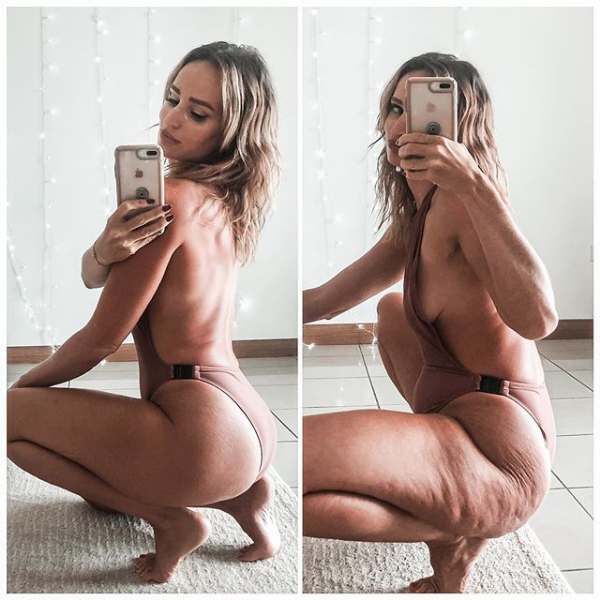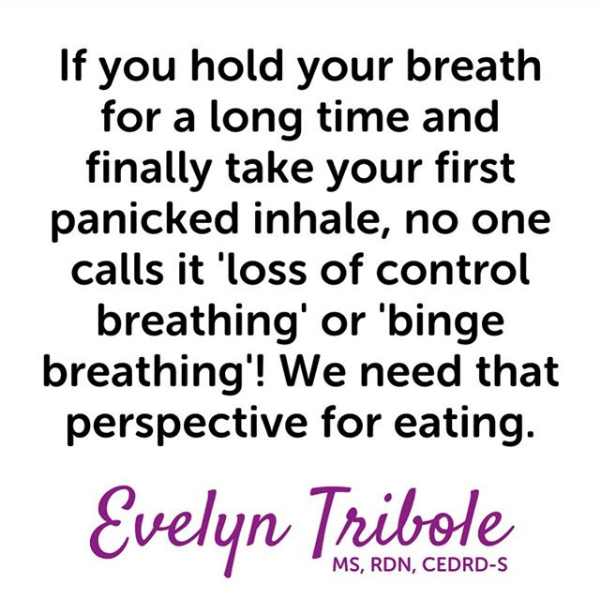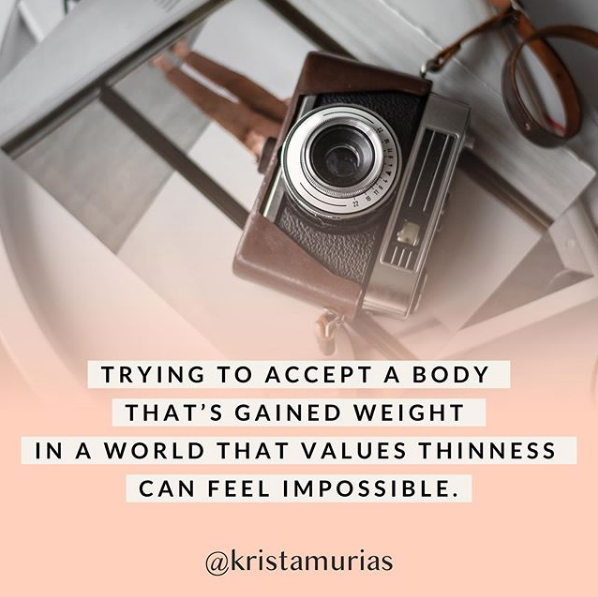I was twelve when I was first told to watch my weight. Friends of mine learned even earlier that their figure and their weight was crucial in defining who they were. This does not happen too early – in my opinion it should never happen. The minute you start getting your weight ‘under control’, you enter diet culture. For some, a lifelong obsession with their nutrition and weight follows.
What is diet culture?
Diet culture makes us believe that only a thin body is a good body – okay, super-ripped is fine as well. We are obsessed with looking the right way, and try to control our weight accordingly. Exercise is just another piece of the puzzle here. It has nothing to do with having fun in diet culture. Working out is for looking better.
Diet culture is omnipresent; it is the predominant culture, It’s the air we breathe. It’s all around us. And it’s not just the blatant juice fasts, detox teas, skinny coffees, and the magic ‘fat blasting’ pills. It’s woven into the fabric of everyday life so seamlessly we barely notice it’s there at all; in advertising, TV shows, movies, anti-cellulite products, diet-talk in the office, being ‘good’, being ‘naughty’, #fitspo, #cleaneating, and ‘health’ magazines.
Laura Thomas PhD, Just Eat It
Or as health coach Isabel Foxen Duke puts it: “Dieting’ is not an action – it’s a state of mind”. This means you can not determine from a person’s exterior whether they have a diet mentality. They might look healthy and suffer from Orthorexia at the same time – which is an obsessive focus on ‘healthy’ eating and might grow into and eating disorder. They might also be bulimic or in the ‘good’ part of a yo-yo diet cycle.
On the other side it’s very hard to believe in our fatphobic society that fat people can be healthy. We have learned that fat makes you sick, that you will die sooner and have a miserable life altogether. I’m just slightly exaggerating here as according to the World Health Organization “[i]ndividuals with obesity experience stigma from educators, employers, health professionals, the media, and even from friends and family.” Just imagine every time you go to the doctor with any health issue, the first advice they give you is weight loss. This is the reality of many people in bigger bodies.
What’s wrong with diet culture?
Most people want to be thin and not fat – what’s wrong with that? First of all, we are not meant to all be a certain size. If society’s goal weight for us is not in our genes, it will not happen, no matter how hard we try. Or it does and we live a life of constant restriction. If that sounds acceptable to you, feel free to stop reading.
Most people are not able to constantly restrict themselves and therefore enter the diet cycle aka yo-yo effect. They start a diet, restrict their food, see results but finally give in to their cravings, regain the weight (if not more) and start all over again. The problem with these weight cycles is that studies have linked them to serious health conditions such as a loss of muscle tissue, high blood pressure, chronic inflammation, and even some forms of cancer. If pursuing an imaginary goal weight makes people sick, we might reconsider the goal. Which turns out to be rather arbitrary.
All female mannequins you can see in shop windows are severely underweight. This is true for only 8% of male mannequins. Miss America winners have have gotten smaller and smaller in size over the years. While they had a body mass index (BMI) of around 22 in the 1920s, their BMI was around 16.9 in the 2000s. Women seem to have to be underweight to be considered thin enough.
The BMI is not a good indicator for anything really
Speaking of the BMI: When it was invented almost 200 years ago, it was meant to identify the ‘average man’ and never to determine anyone’s healthy weight. It’s creator Adolphe Quetelet was a mathematician, among others, but no physician. He was interested in collecting statistics of populations, not in establishing who was overweight and who was at their ideal weight. It was American life insurances who started to use the BMI to determine how they should charge future policy holders. The link between the BMI and health risks was born.
This link has been rightfully criticized in recent years. For one, the BMI is deeply racist. It is based on the weight data of white Western Europeans. It does not work for Black or Asian people for example. Not that it works particularly well for White people but according to studies, Black people will be classified as overweight too often while Asian people will not be classified as overweight often enough.
The BMI is also not a sufficient measure to determine someone’s health. Health promoting behaviors have proven to have a way bigger impact on health. A 2012 study measured people’s weight as well as the following healthy habits: eating five fruits or vegetables a day, regular physical activity, moderate alcohol consumption and not smoking. The ‘shocking’ finding: As soon as even just one healthy habit comes into play, weight starts to take the back seat when it comes to health risks. People who followed all four healthy habits had the lowest mortality risk, independent from their BMI! By the way, your health depends only to a third on your personal behavior anyways.
Ready for a healthy approach to eating? Meet Intuitive Eating
Intuitive Eating is a weight neutral and holistic approach to eating and health.
Intuitive Eating is a process to help you get out of your head when it comes to food and body image and tune into the signals your body is sending. So many of us feel guilt or anxiety about eating the ‘wrong’ things. We worry and beat ourselves up for that doughnut we had last week. Intuitive Eating helps break down arbitrary food rules and restrictions and external influences over what you can and can’t eat so you can focus on internal cues. It’s about relearning how to eat from the ground up!
Laura Thomas PhD, Just Eat It
Intuitive Eating was developed in 1995 by dieticians Evelyn Tribole and Elyse Resch. Its 10 principles not only cover hunger and fullness and healthy eating but also body image, dealing with emotions and enjoyable exercise. Weight neutrality might be the hardest part of Intuitive Eating at the beginning. This nutrition concept does not promise weight loss at all but peace with food and your body. “Your set point weight is the weight you naturally arrive after you let go of dieting and eat in accordance with your bodies natural hunger signals.” – This is how health coach Isabel Foxen Duke specifies it in her ebook. ‘How To Not Eat Cake…Really Fast, Standing Up, When Nobody’s Looking’.
How to start out with Intuitive Eating
Starting out with Intuitive Eating is so hard because many of us have lost their intuition around food. We have learned to rely on the number on the scale and diet plans. Relearning to look for hunger and fullness cues as well as of your body’s and soul’s needs in general can be daunting.
There are a lot of great resources on- and offline which can help you to get started. Many of them are free. As a first step, you might find it helpful, to take the time to read the aforementioned 10 principles of Intuitive Eating. To relearn how being hungry and full feel, the hunger & satisfaction guide by Laura Thomas might help. Feeling hungry can be very different from person to person and it’s not just about a growling stomach. Some people start to feel light headed or experience low energy levels. Learn how your body tells you that it’s time to eat.
As Intuitive Eating is not just about food but your overall physical and mental health, I’ll briefly talk about emotional eating here as well. First of all, I want to emphasize that there’s nothing wrong with emotional eating per se. Sometimes it’s the only way we know (or want!) to deal with some emotions. It becomes problematic when you feel that it doesn’t help you at all and that another response to your feelings might be more helpful. A first step to learn how to cope with your emotions other than eating is to be able to describe what you feel. This is often harder than it sounds. I’ve printed out this feelings wheel to help me specify emotions when I am not sure what exactly it is that I feel. Naming feelings can be a key to finding a variety of methods to deal with them. Laura Thomas goes way more into detail about emotional eating in her book ‘Just Eat It’.
And while you are getting to know your hunger cues and emotions better, let’s talk about mindful movement as well. Many fitness programs and social media accounts will have before and after pictures which show how much thinner or more toned a specific regimen will make you. That extremely reduces the effects of exercise to those that are visible to the eye. You will profit so much more from exercise. While you will end up feeling more fit, exercise will also reduce inflammation, blood pressure, the risk of dementia, hip fractures and heart disease. You don’t have to ‘go hard or go home’ to reap these benefits. Find a type of movement you enjoy and go for it.
Clean up your social media feed, not your food choices
In her book ‘Just Eat It’ nutritionist Laura Thomas suggests to clean up your social media feed. Get rid of health and fitness influencers who promote restrictive diets and give nutrition advice without having a degree. Unfollow accounts that make you feel bad about your body and your weight. Here are some suggestions of body positive accounts to follow instead:

Danae Mercer
Journalist in the Middle East exposing ‘selfie secrets’
Meg Boggs
Author of ‘Fitness for Every Body’
Tiffany Ima
Wellness and body confidence content creator
Sarah Nicole Landry
Mother of soon four, covering body issue topics
You might also want to follow some Intuitive Eating experts with inspiring accounts:

Kirsten Ackerman MS RD
Virtual Intuitive Eating Coach
Evelyn Tribole MS RDN CEDRD-S
Co-creator of Intuitive Eating
Krista Murias
Certified Intuitive Eating counsellor
Molly Bahr LMHC
Intuitive Eating counsellor
Shana Minei Spence MS RDN CDN
Anti-diet dietician
Laura Thomas PhD RNutr
Intuitive Eating, weight inclusive, non-diet nutritionist
Ressources to dig deeper into Intuitive Eating
Books to read
This is the last time I mention ‘Just Eat It’ by Laura Thomas, I promise. But it is how I got hooked on the topic and how I started my personal Intuitive Eating journey. Laura writes in a very clear and no bull style and backs up all her points with studies. Just read it.
I have not read the original book on Intuitive Eating by Evelyn Tribole and Elyse Resch (yet) but it is highly recommended by all sources cited throughout this post.
If you are not ready for a whole book, read the article ‘The Latest Diet Trend Is Not Dieting’ from The Atlantic.
Podcasts to listen to
If you prefer listening to reading, check out ‘The Bodylove Project Podcast’ by Jessi Haggerty and especially her interview with Isabel Foxen Duke.
The ‘Ten Percent Happier’ podcast als has an episode on Intuitive Eating with Evelyn Tribole.
Videos to watch
Isabel Foxen Duke offers a great (and free!) video series on how to “stop feeling crazy around food”.
Disclaimer
I am not a nutritionist and although I thoroughly researched this topic, factual mistakes might still occur. In that case please contact me so I can correct the mistake. And remember: If you suffer from any health issues, please make sure to consult with your healthcare expert before trying something you read online.
The header photo is by Kate Hliznitsova via Unsplash.
